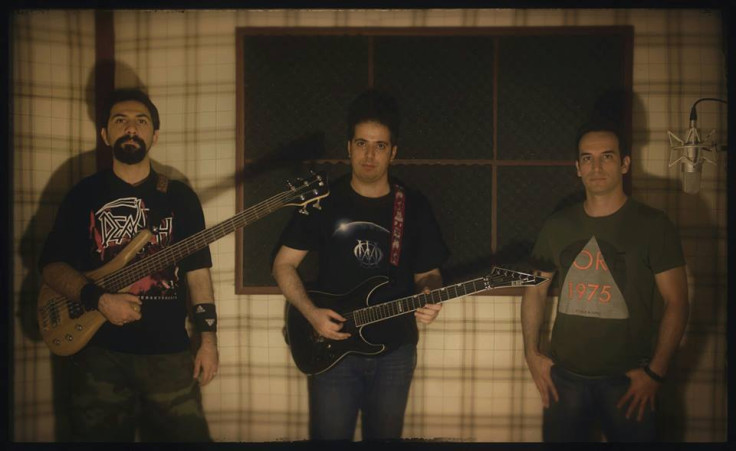Iran rocks! State lifts ban on live shows as musicians sound check a brave new world

From the walls of Amir Khaki's tiny apartment in Tehran, dozens of record sleeves of bands from across the world stare down at a room littered with guitars, from Fenders to Suhrs. The 34-year-old earns his salary working in a foreign exchange office but his passion for the last 15 years has been music.
Khaki has played with a range of groups in Tehran in that time, doing everything from composing soundtracks for movies to performing with cover bands performing Western hits. He is currently working on an album that fuses traditional Iranian music with jazz. He is also old enough to remember when being a musician in Iran wasn't so easy.
We gradually realized that instead of imitating Western rock or metal, we needed to create our own music – music that belongs to this land.
"Access to new technology and the internet has had a positive effect on the young generation. As well as the access to music from across the world, we also have access to the materials we need. This is a country where music was banned for 20 years but in the 10 years we have seen Iranian musicians creating solid work," he said.
That has been shown in the kind of music that Iranian bands are creating over the past decade, he said. At the turn of the millennium most rock bands – including his own – sought to imitate Western bands, both in their music and their style. Now Iranian bands are returning to traditional instruments and styles and fusing them with contemporary world music. The result is an Iranian sound and an Iranian message, he said.
"I realized that I had to speak our words before saying theirs. Let me give an example: an American musician may be able to play the kamancheh (a traditional Iranian instrument) technically well, but he cannot convey its real feelings. It is the same for rock music. We gradually realized that instead of imitating Western rock or metal, we needed to create our own music – music that belongs to this land," Khaki said.
This will not come overnight, said Khaki, and there will be plenty of failures alongside successes. But the most important thing is that Iranian musicians are using their new found freedom and the spirit of openness that has accompanied the election of President Hassan Rouhani and the recent nuclear deal with the US and Europe – which will see sanctions on Iran lifted – to discover an Iranian voice.

For Khaki, his inspiration has been life in Iran as a young musician, both good and bad. Iran has seen wars, restrictions and sanctions, but it has also seen new freedoms – none more so, he said than in recent years. And while Iran lacks higher education facilities for musicians and well qualified teachers, he is positive about the future.
"I've never seen such an open and flourishing environment as these two recent years. I see a promising future. If the trend continues like this the foundation of our music will be the skills we have [as musicians] not the conditions that we live in. I don't say there are not restrictions [now, but] I don't doubt that a new generation can make a revolution in [our] music industry," he said.
Iranian musicians were not always so positive. While there was a brief period of liberalism with the election of former president Mohammad Khatami in 1997, eight years of rule by hardliner Mahmoud Ahmadinejad from 2005 to 2013 – who banned Western music when he came to power – saw heavy restrictions on the holding of concerts, particularly for rock musicians. These restrictions were illustrated in the award winning 2009 film No One Knows about Persian Cats.
Hadi Kiani, 35, has lived through all three eras – Khatami, Ahmadinejad and Rouhani – and as such understands how far music in Iran has come better than anyone. He began his career performing instrumental music and then formed a band that performed with English lyrics, one of few active at that time. He said that only now is life for musicians beginning to return to how it was under Khatami in the 1990s.

Not least, he said, that instead of concerts being outright banned, it is now possible to apply for permission to hold them in Tehran. He is only now thinking about applying to do so.
"The market is getting better. I believe the procedure for officially performing this music is more structured than before. These days there are rules and regulations for releasing albums and holding concerts, rules which did not exist before. I am aiming high. I've always had the dream to work at the world level and arrange tours and perform concerts with famous bands," he said.
But equally he is keeping things in perspective. While he may be able to organise shows infrequently, rock and heavy metal in Iran is unlikely to become anything resembling a business any time soon. He said that the need for musicians to have other jobs and careers in order to support themselves will always hold back the Iranian scene.
Equally having seen the boom to bust to boom again cycle once already, he will never take the relative freedom of Iranian musicians since 2013 for granted.
"Nothing is clear. For 14 years ago when the market was thriving I thought that everything would be all right and I could easily release albums and arrange music tours and that [it] could become our business. But then we witnessed rock and metal music decline due to more restrictions - concerts were called off and getting permission was impossible.
"Now once again the circumstances are getting better but I cannot predict if this positive trend will continue to exist in future. At present, we just want to use this opportunity and again get back to the booming era of music," he said.
Maryam Barbak is a freelance journalist based in Tehran.
© Copyright IBTimes 2025. All rights reserved.






















